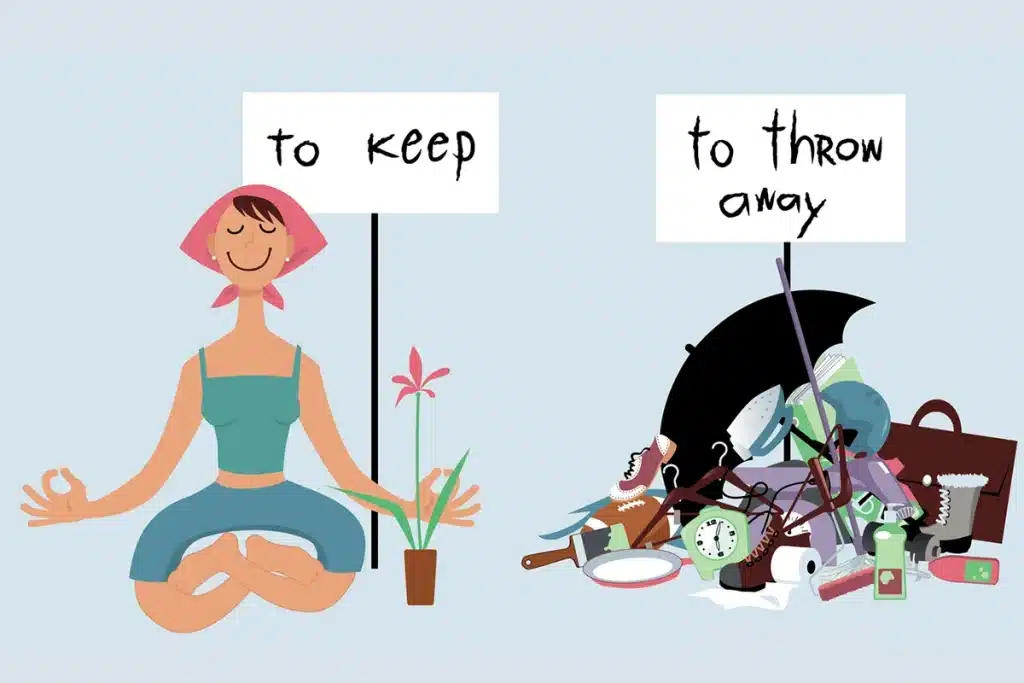If you’ve ever felt overwhelmed by clutter—whether it’s a stack of papers on your desk or a jumble of thoughts in your mind—you’re not alone! We all experience the chaos of life piling up around us, which can make it hard to feel focused and at peace. Luckily, there are simple decluttering habits you can adopt to clear both physical and mental clutter.
Think of it as a little “life detox” to help you feel more organized, calm, and ready to take on the world. In this guide, we’re breaking down approachable habits for decluttering both your home and your mind. From quick five-minute tidy-ups to mindful practices that help reduce stress, these tips are all about simplifying your life in a realistic way. So, let’s dive into the power of decluttering—starting with just a few small steps.
1. Start Small: The Five-Minute Declutter Habit
If the idea of decluttering your entire home sounds overwhelming, start with just five minutes a day. Pick a small area—a drawer, a countertop, or even your desk—and set a timer. For those five minutes, focus only on that space. Throw out any obvious trash, move items that don’t belong, and straighten up what’s left. This bite-sized approach helps ease you into the habit without feeling like a major project. Plus, by doing a little each day, you’ll see progress without the stress of a full-blown cleaning spree.
Keeping a few containers or baskets handy can help streamline this routine. For example, a catch-all basket for things like keys and chargers can keep surfaces clear and organized. When you’re ready, expand this practice to other areas of your home. You’d be surprised how impactful five minutes can be!

2. Daily Decluttering Habits: The Brain Dump Exercise
Just like physical clutter, mental clutter builds up quickly. To clear your mind, try the “brain dump” exercise. Grab a notebook or open a digital note app and write down everything that’s swirling in your head. This could be tasks you need to finish, thoughts that are bothering you, or even random ideas. The goal is to free up mental space so you can focus more effectively.
Setting aside five to ten minutes each morning for a brain dump can be a game-changer, especially on busy days. This habit not only helps clear your mind but also gives you clarity about what truly needs attention. After jotting everything down, you can go through and prioritize tasks, which makes the day feel more manageable and less overwhelming.
3. Create a “No Clutter” Zone in Your Home
Designating a clutter-free zone is another great way to reduce the feeling of chaos in your home. This could be a corner of the living room, your kitchen counter, or even your bedside table. The idea is to choose a small, manageable area and commit to keeping it clear at all times. This means no papers, no stray belongings, and definitely no piles of laundry!
By protecting one area from clutter, you create a mini-sanctuary of calm that you can enjoy throughout the day. This zone becomes your reminder of the peace that decluttering habits can bring, which can motivate you to expand this practice to other areas. You may find yourself gradually extending the boundaries of your “no clutter” zone as you get used to the calm it brings.
4. Mindful Decluttering: Letting Go of “Just in Case” Items
Many of us hold onto items “just in case” we might need them someday. While a bit of caution isn’t a bad thing, too many “just in case” items can add to clutter and make it harder to keep spaces tidy. To practice mindful decluttering, start by going through one area—like your closet or bathroom—and ask yourself how often you really use each item. If it’s been sitting unused for months, consider donating or discarding it.
For example, you probably don’t need three extra coffee mugs or a sweater you haven’t worn in years. Learning to let go of these items can be freeing and make your space feel more open and breathable. Mindful decluttering habits help you keep only the items that truly add value to your life, while also creating more space for the things that matter most.
Not about perfection
Decluttering isn’t about perfection—it’s about creating more breathing room in your life. A home or mind free of excess can create space for what truly matters, whether that’s quality family time, the pursuit of personal goals, or simply more peace of mind. By building small, sustainable decluttering habits, you can gradually clear both mental and physical clutter, helping you feel lighter and more in control. The trick is not to think of decluttering as a “one-time event” but as an ongoing practice that fits into your daily routine and evolves as your life does.
Go For Small Wins
Start by celebrating small wins—a tidied drawer, a shelf cleared of unnecessary items, or even a five-minute meditation session that eases your mind. Each tiny step is progress toward a more organized, peaceful home and mind, and these small steps add up over time. When you allow yourself to take it slow, the process becomes far less overwhelming. Remember, every bit of decluttering, however small, is a move in the right direction. A consistent effort can transform your environment and your mindset over time. For example:
The Joy of an Organized Drawer
Start with something manageable, like a single drawer in your kitchen or bathroom. Clear it out, toss expired items or things you never use, and reorganize what’s left. Opening a tidy drawer is a surprisingly satisfying reminder of your progress.
A Five-Minute Tidy-Up Before Bed
Set a timer for five minutes and do a quick sweep of any cluttered surfaces, like your coffee table or kitchen counter. This small habit leaves your home feeling fresh and welcoming the next morning, a great way to start the day.
Consider the mental freedom that comes from decluttering your digital space, too. A cleared inbox, fewer notifications, and a streamlined phone can reduce daily stress and distractions. Physical clutter often mirrors our mental state; similarly, digital clutter can pull focus and create a sense of overwhelm. Decluttering doesn’t just mean physical possessions but also simplifying the spaces where you spend a significant amount of time, including your digital devices.
Moreover, decluttering habits allow you to reconnect with what’s truly valuable to you. When you let go of things that no longer serve a purpose, you can appreciate and make room for what truly enhances your life. This applies to both the items in your home and the thoughts in your mind. Embracing a decluttered lifestyle means giving yourself permission to focus on quality over quantity, and you may find this shift in mindset extends to many areas of your life.

Decluttering your home and mind is a gradual journey, not a destination. As you become more mindful of what you allow into your physical and mental spaces, you may notice a ripple effect, improving everything from your mood to your productivity. Taking these small, simple steps each day creates a lasting, positive impact.
For more clever ideas on simplifying and enhancing your daily life, check out our other articles in the Clever category. You’ll find tips, tricks, and unique insights to keep you inspired and make life’s daily demands feel more manageable.

